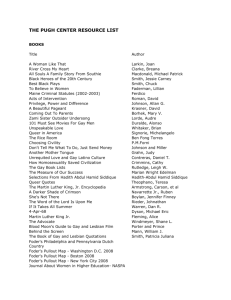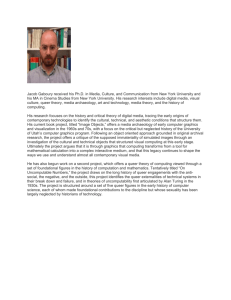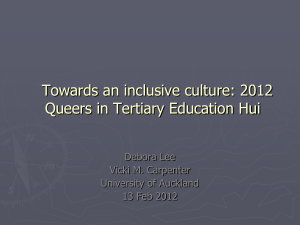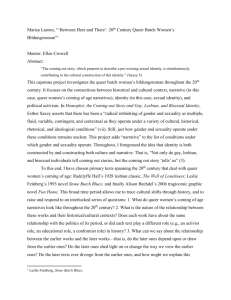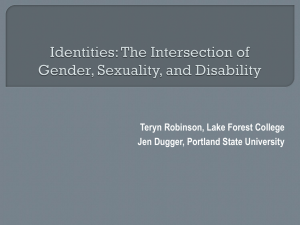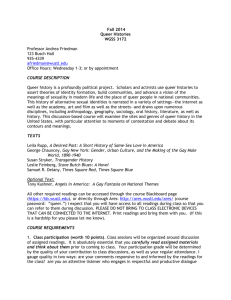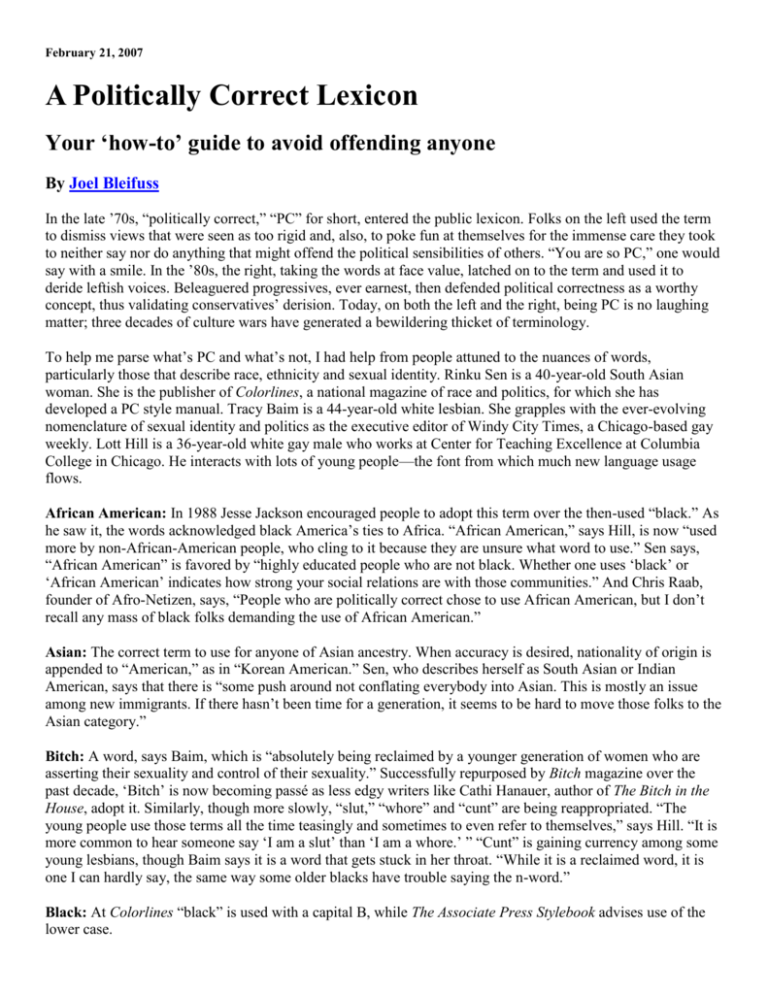
February 21, 2007
A Politically Correct Lexicon
Your ‘how-to’ guide to avoid offending anyone
By Joel Bleifuss
In the late ’70s, “politically correct,” “PC” for short, entered the public lexicon. Folks on the left used the term
to dismiss views that were seen as too rigid and, also, to poke fun at themselves for the immense care they took
to neither say nor do anything that might offend the political sensibilities of others. “You are so PC,” one would
say with a smile. In the ’80s, the right, taking the words at face value, latched on to the term and used it to
deride leftish voices. Beleaguered progressives, ever earnest, then defended political correctness as a worthy
concept, thus validating conservatives’ derision. Today, on both the left and the right, being PC is no laughing
matter; three decades of culture wars have generated a bewildering thicket of terminology.
To help me parse what’s PC and what’s not, I had help from people attuned to the nuances of words,
particularly those that describe race, ethnicity and sexual identity. Rinku Sen is a 40-year-old South Asian
woman. She is the publisher of Colorlines, a national magazine of race and politics, for which she has
developed a PC style manual. Tracy Baim is a 44-year-old white lesbian. She grapples with the ever-evolving
nomenclature of sexual identity and politics as the executive editor of Windy City Times, a Chicago-based gay
weekly. Lott Hill is a 36-year-old white gay male who works at Center for Teaching Excellence at Columbia
College in Chicago. He interacts with lots of young people—the font from which much new language usage
flows.
African American: In 1988 Jesse Jackson encouraged people to adopt this term over the then-used “black.” As
he saw it, the words acknowledged black America’s ties to Africa. “African American,” says Hill, is now “used
more by non-African-American people, who cling to it because they are unsure what word to use.” Sen says,
“African American” is favored by “highly educated people who are not black. Whether one uses ‘black’ or
‘African American’ indicates how strong your social relations are with those communities.” And Chris Raab,
founder of Afro-Netizen, says, “People who are politically correct chose to use African American, but I don’t
recall any mass of black folks demanding the use of African American.”
Asian: The correct term to use for anyone of Asian ancestry. When accuracy is desired, nationality of origin is
appended to “American,” as in “Korean American.” Sen, who describes herself as South Asian or Indian
American, says that there is “some push around not conflating everybody into Asian. This is mostly an issue
among new immigrants. If there hasn’t been time for a generation, it seems to be hard to move those folks to the
Asian category.”
Bitch: A word, says Baim, which is “absolutely being reclaimed by a younger generation of women who are
asserting their sexuality and control of their sexuality.” Successfully repurposed by Bitch magazine over the
past decade, ‘Bitch’ is now becoming passé as less edgy writers like Cathi Hanauer, author of The Bitch in the
House, adopt it. Similarly, though more slowly, “slut,” “whore” and “cunt” are being reappropriated. “The
young people use those terms all the time teasingly and sometimes to even refer to themselves,” says Hill. “It is
more common to hear someone say ‘I am a slut’ than ‘I am a whore.’ ” “Cunt” is gaining currency among some
young lesbians, though Baim says it is a word that gets stuck in her throat. “While it is a reclaimed word, it is
one I can hardly say, the same way some older blacks have trouble saying the n-word.”
Black: At Colorlines “black” is used with a capital B, while The Associate Press Stylebook advises use of the
lower case.
Boi: A word, says Hill, that is “used by young queer people to refer to either young gay males or young females
who are presenting as males.”
Brown: A general term for people who are not white. Colorlines uses “brown” in a casual or playful way. “We
might have a headline ‘Brown People to the Back’ in a story about restaurant hierarchy,” Sen says. Sometimes
used to refer to Latinos, as in the “black-brown” coalition that helped elect Harold Washington mayor of
Chicago in 1983.
Chicano: Correct term for people of Mexican ancestry, popularized during the civil rights movement. “We use
it to refer to U.S.-born people of Mexican descent,” says Sen. “Mexican American is the more distant, politer
thing to say.”
Dyke: A word lesbians have reclaimed. Hill, however, says that among the young it is “on its way out.”
Fag (faggot): The new “queer.” “Like the n-word, it’s a word that can be said by gay people,” says Hill. “I hear
‘fag’ a great deal, especially among queer-identified young people, like ‘don’t be such a fag’ or ‘you are such a
fag.’ “
Feminist: “A word that the younger generation doesn’t always embrace,” is how Baim, 44, describes it. A lot of
young women, she says, are “feminists but they don’t want to be pigeonholed.” “Feminist somehow became a
tainted word along the way,” says Hill. “I have heard a lot of people say, ‘this sounds feminist’ or ‘I used to be a
feminist.’ “
Gay: The word used to refer to males and, inclusively, to the whole gender-bent community. “College-age
people are more likely to refer to themselves as queer,” say Hill. “People out of college are more likely to refer
to themselves as gay.”
Girl: “‘Girl’ is used by older women,” says Baim. “It is kind of nice because it used to be used derogatorily and
now it is used in a fun way.”
GLBT: Shorthand for GLBTQ2IA.
GLBTQ2IA: The acronym for Gay, Lesbian, Bi, Transgendered, Queer, Questioning, Intersex, Allies. “This is
coming from the youth movement, the college campuses, it has not seeped into the whole community at this
point,” says Baim, who at the Windy City Times uses GLBT, an acronym the New York Times has not yet seen
fit to print.
Guys: Very controversial. Used, especially in the Midwest, when referring to a group of people. “In Chicago
that word gets used a lot,” says Hill. And Baim says, “I use it all of the time.” Some feminists, like Andi Zeisler,
the editor of Bitch, find “guys” problematic. “We assume the descriptor ‘guys’ denotes a quality of
universality,” she says. “It would be hard to imagine a group of men being addressed by their server as ‘hey you
gals’ and not taking offense, but the reverse happens all the time.”
Hir (Hirs): Gender neutral for him and her. At Wesleyan University, incoming freshmen are instructed to use
gender-neutral pronouns in campus correspondence. As one person wrote on the university’s online Anonymous
Confession Board, “I am usually attracted only to people of hir original gender, rather than hir intended gender.
As such, I’m afraid that I’m, like, viewing hir wrong, or not respecting hir wishes or something.”
Hispanic: “We never use Hispanic,” says Sen. “It privileges the European roots of the identity of Mexicans
born in the United States.” Hispanic, however, is the preferred term of people in the Southwest whose families
are descendents of Spanish colonists.
Indian: The preferred term for Native Americans. “Indians either use their specific tribal name or use Indian,”
says Sen. “You use the qualifier American when you need to distinguish from Indian Indians.”
Latino: (capital “L,” with “a” or “o” at the end used to connote gender) Politically correct term for those from
Spanish or Portuguese speaking cultures. “We use it instead of Hispanic when we want to refer to many
different national groups where there has been an indigenous-European mix,” says Sen. [Reader Comment: And
another. “Latin@” is often used in writing to encompass the female- and male-gendered variants Latina and Latino.
The @ is both “a” and “o.” This is done mostly by politically active leftish Latin Americans and Latin@s. Posted by
teofi on Feb 21, 2007 at 11:24 AM]
Lesbian: “The younger generations are less connected with the terms ‘gay’ and ‘lesbian’,” says Baim. “Lesbian
is out of favor as a self-identifying label, it means something political, something more rigid than the younger
generation is comfortable with.”
Macaca: The latinization of the Bantu “ma-kako,” meaning monkey. According to the Global Language
Monitor, former Sen. George Allen (R-Va.) helped make this the most politically incorrect word of 2006 by
using it to refer to an Indian American.
Native American: Some Indians object to the term, seeing it as a way to linguistically eradicate “Indian” and
thus the history of their oppression by whites. “I almost always hear Native American, and in the more
enlightened conversations there is usually ‘indigenous’ thrown in there somewhere,” says Lott. Sen says,
“Native American seems to be a more distant construction, developed by academics.”
Nigger: “It is a word that white students struggle with and black students use pretty freely,” says Hill. “Young
people are much more open to using it, especially young people who are black or who have been exposed to
more diverse groups of people.” While Sen says, “I can’t imagine a political or a social multiracial situation
where it would be appropriate, but I know that is because I am too old. The word is so prevalent in the popular
youth culture, grounded in hip-hop, that I wouldn’t like to predict where that debate is going to end up. But if
the popular culture ends up agreeing that it is okay to use, then I think there are a lot of pretty scary
implications.”
Queer: Anyone who falls outside the lines of straight. “It has been reclaimed far ahead of faggot or dyke,” says
Baim. “It is our buzz word,” says Columbia College’s Hill. “It is how we avoid saying all of those letters
[GLBTQ2IA].” REM lead singer Michael Stipe, for example, is queer, not gay. “For me, queer describes
something that’s more inclusive of the gray areas,” he told Butt, a pocket-sized Dutch “fagazine.” “It’s really
about identity I think. The identity I’m comfortable with is queer because I just think it’s more inclusive.”
Transgendered: (trans) A person who is not presenting as their biological gender. “It is fascinating how
transgendered is becoming like an octopus with all the tentacles of identity and personal design. The
transgendered movement is burgeoning and fluid, they are creating all of these new ways to define who they
are,” says Baim.
Ze: Gender neutral for he or she. As Mary Boenke writes on the PFLAG (Parents, Families and Friends of
Lesbians and Gays) Web site: “When talking with Leslie Feinberg, noted transgender author, I asked Leslie
which pronouns to use. Ze shrugged hir shoulders and said ze didn’t care.”
Joel Bleifuss is the editor of In These Times, where he has worked as an investigative reporter, columnist and editor
since 1986. Bleifuss has had more stories on Project Censored's annual list of the “10 Most Censored Stories” than
any other journalist.
http://www.inthesetimes.com/article/3027/a_politically_correct_lexicon
KATE BORNSTEIN (born 1948) and BARBARA CARRELLAS (a little
younger) live, love, work, and make art outside the boundaries of traditional
gender and sexual identities. Kate is the author of Gender Outlaw, My Gender
Workbook, and Nearly Roadkill and is a highly acclaimed performance artist. She
was born a boy, grew into a man, became a woman, and now considers herself
none of the above. Barbara Carrellas, a former prostitute, dancer and nude model,
is an internationally-acclaimed sex educator and the cofounder of Erotic
Awakening, a pioneering series of workshops focusing on the physical, spiritual,
and healing powers of sex. Barbara has identified as heterosexual, bisexual,
lesbian, gay, pansexual, omnisexual, and just plain queer. She now considers
herself all of the above . . . for starters. (http://www.queerculturalcenter.org/)
From Gender Outlaw: On Men, Women and the Rest of Us by Kate Bornstein
I identify as neither male nor female, and now that my lover is going through his [originally her] gender
change, it turns out I’m neither straight nor gay.
I know I’m not a man; about that much I’m very clear, and I’ve come to the conclusion that I’m probably
not a woman either, at least not according to a lot of people’s rules on this sort of thing. The trouble is,
we’re living in a world that insists we be one or the other....
When I was a kid, everyone else seemed to know they were boys or girls or men or women. That’s
something I’ve never known; not then, not today. I never got to say to the grownups, “Hold on there – just
what is it about me that makes you think I’m a little boy?”
Those who came out of their closets were either studied under a microscope, ridiculed in the tabloids, or
made exotic in the porn books, so it paid to hide. It paid to lie....
Going through a gender change is not the easiest thing in the world to do, but I went through it because I
was so tired of all the lies and secrets.
There’s a real simple way to look at gender: Once upon a time, someone drew a line in the sands of a culture
and proclaimed with great self-importance, “On this side, you are a man; on the other side, you are a
woman.” It’s time for the winds of change to blow that line away.
Opposing view: Sociologist Harold Garfinkel’s 8 rules of gender
1. There are two and only two genders (male and female).
2. One’s gender is invariant.
3. Genitals are the essential sign of gender (female-vagina, male-penis).
4. Any exceptions to two genders are not to be taken seriously (they must be jokes, ilness, etc.).
5. There are no transfers from one gender to another except ceremonial ones or masquerades.
6. Everyone must be classified as a member of one gender or another.
7. The male/female dichotomy is a “natural” one (i.e., not dependent on anyone’s opinion).
8. Membership in one gender or the other is “natural.”
Never mind the reassign
For Toronto’s the Cliks, queer and transgender politics take a backseat to rock
by ANDREA ZANIN
Toronto-based rockers the Cliks have attracted quite a lot of attention this
year. Their music has been compared to the White Stripes and David Bowie,
and their major-label debut album, Snakehouse, was released in April by Warner in Canada and Tommy Boy in the U.S.
This summer, the Cliks played several cities with Cyndi Lauper’s True Colors tour, and now they’re making a few stops
in Canada before heading off to open on the Cult’s U.S. tour.
It should come as no surprise that an all-queer band with a female-to-male transgender frontman, the charismatic Lucas
Silveira, would have a distinctly queer fan base. But the labels are betting that the foursome (with bassist Jen Benton,
drummer Morgan Doctor and guitarist Nina Martinez) has crossover potential, and Silveira has high hopes as well.
“All I know is that we’re creating music,” he says. “To be good, it should be universal. The kind of stuff I write about is
particular to the human spirit as opposed to a community or a politic of people.”
Silveira is happy to embrace his pop roots. “I’m not underground. I grew up listening to pop rock and mainstream rock
music, so of course the music I create would be of that genre.”
Much has been made of Silveira’s transgender status—the Toronto Star described him as “on the verge of becoming the
first transgendered pop heartthrob ever to register on mainstream radar,” and he’s been told he’s the first trans male to be
signed to a major label.
“Everyone has a story,” he says. “This just happens to be my story and I happen to be a songwriter. I’m visible because
it’s important to talk about these things. But I walk around thinking about music, not gender.”
Musically speaking, however, a gender change is more than an interesting factoid. A typical female-to-male transition
involves using testosterone to help develop masculine physical traits—including a deeper voice, which can take several
years to mature. For a singer, that’s no small consideration, especially since Silveira’s transition began just as the band
was embarking on the upward spiral of success.
As with everything else, though, Silveira has made some unusual choices—he’s opted out of taking hormones. “I decided
right at the beginning about the effects it would have on my voice, and I just couldn’t take the risk,” he explains. “Having
a moustache would have been nice but it’s not worth losing my voice. It’s carried me throughout my life. I felt sorry for
myself at first but because of this, I was sort of forced to start thinking about gender a little differently.”
He did have a double mastectomy—top surgery—“so that’s made me feel a lot more comfortable with my body. But I
don’t necessarily need to have a beard or a deep voice to consider myself a transgender male.”
Silveira wrote the album while going through an intense period in his life, and that certainly comes through in the music.
“It’s a strong album not just musically but because it’s about going to the deepest, darkest places inside yourself and
coming out and finding hope and strength that you never thought you had,” he says. “But if people just want to dance
around and say, ‘Yeah, it’s hot, that’s a great song’—well, that’s fine too.”
The entire band are out members of the LGBT community. Silveira is a transman, Benton and Martinez are lesbians, and
Doctor identifies as queer.
http://www.montrealmirror.com/2007/110107/music4.html
Postgenderism (Wikipedia)
According to futurist George Dvorsky1, postgenderism is a diverse social, political and cultural movement whose
adherents affirm the voluntary elimination of gender in the human species through the application of advanced
biotechnology and assisted reproductive technologies. Advocates of postgenderism argue that the presence of gender
roles, social stratification, and sexual dimorphisms are generally to the detriment of individuals and society. Given the
radical potential for advanced assistive reproductive options, postgenderists believe that sex for reproductive purposes will
either eventually become a thing of the past or that all human beings will have the ability, if they so choose, to both carry
a pregnancy to term and father a child, placing the entire need for gender and gender differences into question.
Cultural roots
Postgenderism as a cultural phenomenon has roots in feminist, masculist, transgenderist and queer theory, along with the
androgyny, and metrosexual/technosexual lifestyles. However, it has been through the application of transhumanist2
philosophy that postgenderists have conceived of the potential for actual morphological changes to the human species and
in how future humans will reproduce. In this sense, it is an offshoot of transhumanism, posthumanism, and futurism.
An influential work in this regard was socialist feminist Donna Haraway's essay, “A Cyborg Manifesto,” which
argued that women would only be freed from their biological restraints when their reproductive obligations were
dispensed with. In other words, Haraway believes that women will only achieve true liberation once they become
postbiological organisms, or postgendered.
Types of postgenderism
Postgenderists are not exclusively advocates of androgyny, although most believe that a “mixing” of both masculine and
feminine traits is desirable – essentially the creation of androgynous individuals who exhibit the best of what males and
females have to offer in terms of physical and psychological abilities and proclivities. Just what these traits are exactly is a
matter of great debate and conjecture.
Androgyny aside, radical feminism advocates the elimination of gender altogether (arguing that masculinity and
femininity are oppressive social constructs), which can be construed as a type of postgenderism.
Future technologies
In regard to potential assistive reproductive technologies, it is believed that reproduction can continue to happen outside
of conventional methods, namely sexual intercourse and artificial insemination. Advances such as human cloning,
parthenogenesis and artificial wombs may significantly extend the potential for human reproduction.
It is also thought that posthuman space will be more virtual than real. Individuals may consist of uploaded minds
living as data patterns on supercomputers or users engaged in completely immersive virtual realities. Postgenderists
contend that these types of existences are not gender-specific thus allowing individuals to morph their virtual appearances
and sexuality at will.
Sexuality
Postgenderists maintain that a genderless society does not imply the existence of a species disinterested in sex and
sexuality. It is thought that sexual relations and interpersonal intimacy can and will exist in a postgendered future, but that
those activities will take on different form.
For example, the act of sex may be "performed" in virtual reality, while one-to-one communication may be
enhanced by such potentials as technologically-assisted telepathy. Physicality and gender-specificity as a prerequisite for
sexual relations, argue postgenderists, will become less relevant with the advent and maturation of pending technologies.
For those who wish to continue engaging in physical intercourse, the possibility may exist for sexual
reassignment. Surgery that allow transgendered individuals to alter their gender may also be used for those who wish to
change their morphology as they see fit and not have to remain fixed to one particular gender.
The possibility also exists that some postgendered individuals will choose not to engage in any kind of sexual
activity whatsoever. Posthumans, or the postgendered, may be involved in different activities altogether or have a mindspace that is beyond sex and gender.
1
George P. Dvorsky is a futurist, the organizer of the Betterhumans online community, and author of the Sentient Developments blog:
http://sentientdevelopments.blogspot.com/
2
Transhumanism is an international intellectual and cultural movement supporting the use of new sciences and technologies to
enhance human mental and physical abilities and aptitudes, and ameliorate what it regards as undesirable and unnecessary aspects of
the human condition, such as stupidity, suffering, disease, aging and involuntary death.

